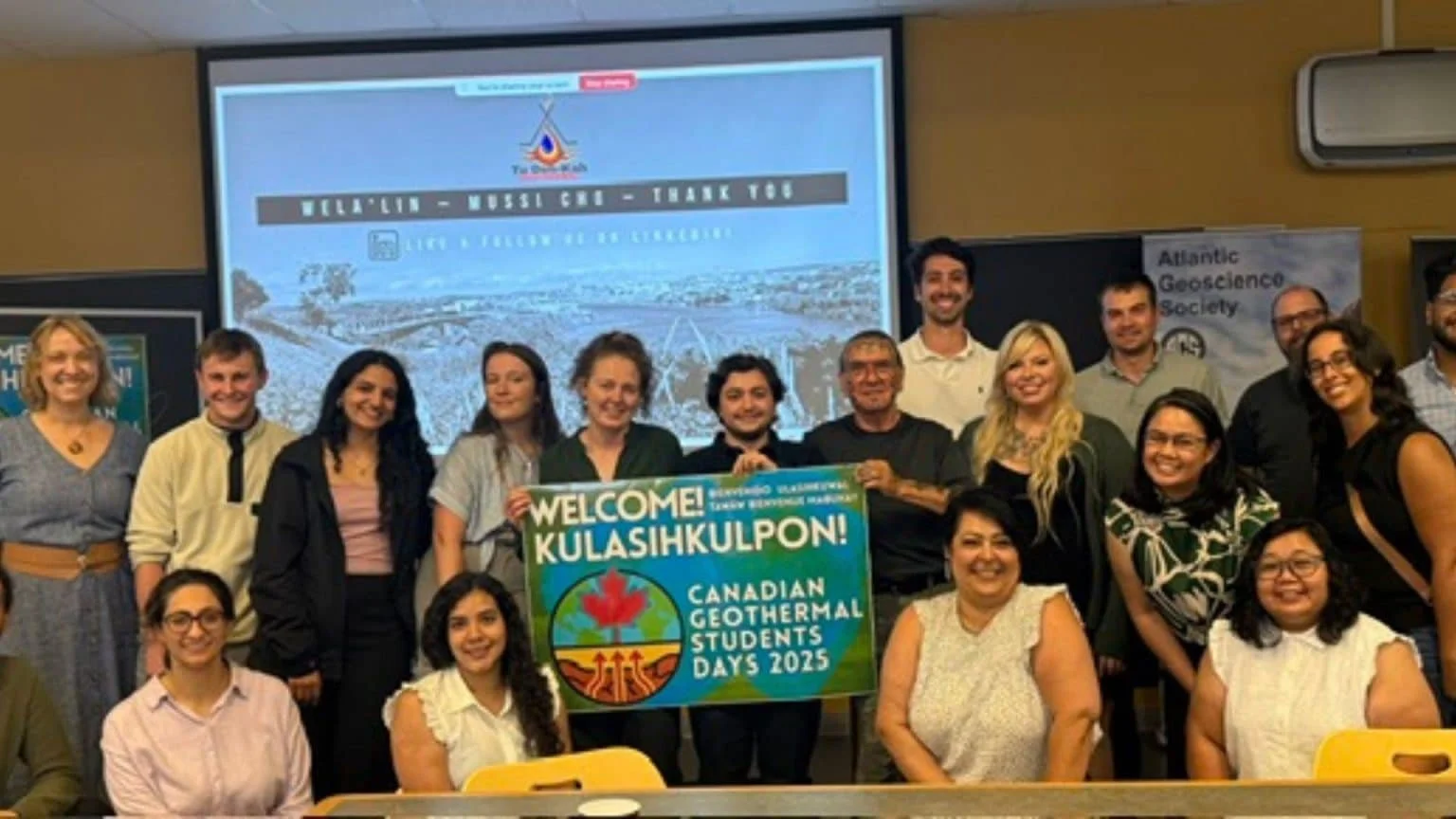September 5, 2025 By Ed Hitchins
Tu Deh-Kah sent Andrea Warren (middle row, third from right) and a team to Canadian Geothermal Students’ Days in Fredericton in late August. (Photo submitted by Andrea Warren)
FORT NELSON, B.C. — It was a busy August for members of the team putting together northeast B.C.’s Indigenous-owned geothermal project.
Tu Deh-Kah’s media and communications specialist and project coordinator Andrea Warren spoke to Energeticcity.ca about an August which had the team going from coast to coast.
““Trips to Victoria, the Northwest Territories and New Brunswick in August 2025 provided networking and promotional opportunities as well as a glimpse into the future.””
Located southwest of Fort Nelson, the project involves taking the old Clarke Lake Gas Field and harvesting heat from highly porous Devonian carbonate in the ground.
Five to six producing wells in the area will bring the hot geothermal brine up to the formation to then be run through a heat exchanger, where it will be converted into steam via a working fluid, most likely isobutane due to its very low boiling point.
The project could provide heat for up to 10,000 homes.
First on the team’s agenda was the Dehcho Clean Energy Conference in the Northwest Territories, hosted by Gonezo Energy from August 5th to 8th.
Warren was at the conference as a co-facilitator and said the event “emphasizes the power of Indigenous voices in remote communities and regions.”
“There are funders there that can help guide you on the sources of funding that could be available and how to apply,” said Warren. “This event has Indigenous people in mind.”
Next was the Victoria Forum, taking place on Vancouver Island. Tu Deh-Kah’s visit to the provincial capital was due to the relationship the company has with the Cascade Institute, a research centre at Royal Roads University.
Warren heard “incredible stories” throughout the event, which took place from August 24th to 26th, in which some presentations showed “the urgent need to fulfill sustainable development goals (SDGs) intersecting with rising geopolitical uncertainty.”
In particular, she took part in a panel featuring former Haida Nation Chief Miles Richardson. Richardson was one of the original members of the sustainability non-profit the David Suzuki Foundation.
“He mentioned the path forward,” said Warren. “He always had to look forward although there were a lot of harmful things [done to his community]. It was still the Elders who always pushed him just to remember you can rise along and bring them along for the journey or you can keep fighting and make things hard.
“Something we always talk about is how the future is clean energy. It’s so close [but] you blink and you might miss it. At the end of the day, we’ll be doing a clean energy transition in Canada whether we’re the ones leading it or we’re the ones paying for it from other communities that are doing it.”
Finally, students involved with the geothermal project travelled with Warren to New Brunswick to the Canadian Geothermal Students’ Days in Fredericton from August 28th to 30th, in which Tu Deh-Kah was given the opportunity to “share” details of the project and Indigenous perspectives.
“It was really neat to see the future in the clean energy field,” said Warren about inspiring younger generations about clean energy. “All of them were working on different pilot projects or researching their graduating projects.
“[It was important] to be able to connect with them, and to share [that] geothermal is actually feasible in Canada.”
Tu Deh-Kah geothermal recently received $1.2 million from the federal government’s Indigenous Natural Resource Partnerships program (INRP) in 2025.
The project is scheduled to be completed in 2027.

